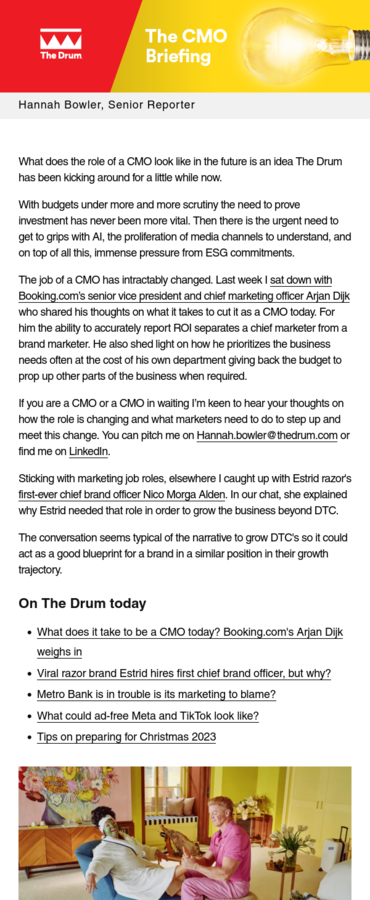How can marketers turn brand purpose into real action and business success?
A focus on purpose and sustainability in marketing is nothing new but we’re entering a new era based on delivering genuine, high-impact solutions to empower consumers. We caught up with Suzanne Mendes, a marketing and communications veteran whose career has spanned the beauty, retail and clean tech industries to learn more.

Energy from renewable sources is a better choice for consumers’ homes and the environment
It’s clear that purpose has become a strong factor in helping businesses build real connections with audiences. For instance, 82% of consumers in the US want a brand’s values to fit with their own, according to 2022 research from Harris Poll.
Those businesses that are built on authentic foundations have the best chance of achieving this. One marketer who believes passionately in that approach is Suzanne Mendes. Mendes currently leads marketing at certified B-Corp Inspire Clean Energy - a mission-driven, clean energy technology company that believes energy from renewable sources is a better choice for consumers’ homes and the environment.
Before joining Inspire, Mendes served as head of marketing and communications for Japanese apparel retailer Uniqlo and held numerous leadership positions in the beauty industry at L’Oreal and Estée Lauder.

Suzanne, can you tell us about your strong belief in the importance of company values and how they can help to drive business success?
The two are inextricably linked. It’s important to know that establishing and leveraging a company’s values is not a marketing tactic. In fact, values-based marketing alone doesn’t really work. Values-led businesses do. In other words, your brand’s values must be integrated across all areas of operation to be truly effective.
Values-led organizations demand alignment enterprise-wide to ensure their mission, purpose and commitments are threaded through all aspects of a company’s ecosystem from its products to supply chain and channel distribution, through to the leadership and talent within an organization.
Advertisement
How can brands move beyond all the talk about purpose and sustainability into real action?
In the case of Inspire and other sustainability brands, we can see that as the outlook of our planet becomes increasingly dire, more and more consumers are hungry for ways they can personally make an impact to shape a better tomorrow.
As a consumer myself, I often feel completely overwhelmed by a sense of paralysis as I witness the climate crisis. So much of the action that’s needed must come from the corporate and public sectors, but that also doesn't mean each of us aren’t accountable in some way to do something. This is where brands like ours come in. We aim to provide simple, accessible and, quite frankly, low-effort, high-impact choices for consumers to be part of the solution. Our goal is to empower our consumers by arming them with a sustainable solution and educating them about their impact.
Advertisement
And how have you leveraged clear values to build a brand at Inspire?
There is often a perception that marketing is just a cost center to the business. As marketers it isn’t sufficient to say to other leaders in your organization “trust me I know what I’m doing.” Rather, we have a responsibility to the CFOs and COOs of the world to build holistic business cases for our strategies before asking for the resources. We then have accountability to ensure tangible outcomes that serve the business at large in the form of quantifiable metrics that will drive the goals of the company forward, like growth and value creation.
Before I started at Inspire, the core mission of the brand was already established, but very little focus and investment had been made in delivering that message to consumers. So I came in and developed that side of the business from the ground up: I built the team and the projected return on an increased investment in marketing. I made commitments about the impact we would have as a result and won the trust and confidence of fellow leaders across the company to go out and deliver on that promise.
Through this internal rigor, we had a big year of company firsts and strong output, including Inspire’s first integrated marketing campaign ‘Power A Brighter World’, and investments in upper funnel engagement that drove a 35% increase in brand awareness in our top market. We also revamped our marketing across all consumer touchpoints, launched our first impact report, first social impact initiative and countless other projects that amplified our mission and successfully engaged our stakeholders.
These strategies supported Inspire’s growth and retention. In the past year our company has grown 37% while hitting above benchmark customer satisfaction scores. We also maintain the highest customer review site rating in our competitive set - with an A+ average on BBB and 4.3 stars on Trustpilot.
Suggested newsletters for you
How much do your own personal values and beliefs play a part in your approach to marketing and values-based brand building?
For me to feel a sense of accomplishment and to be truly effective, I need that alignment between my values, career and where I invest my time and resources. But, very early in my career, I didn't encounter many leaders with shared values that I wanted to emulate. There were a lot of women in senior leadership roles mimicking “traditionally masculine” leadership styles – aggressive, autocratic, controlling – because these behaviors are still what’s most rewarded in the corporate world. Unfortunately, the effect on me, and other underrepresented groups including women, BIPOC or LGBTQIA communities, is a sense of isolation, exclusion and self-doubt. It left me, and I’m sure many others, without a vision or role model for how to lead from a place of authenticity and humanity.
As I progressed, I came across a more diverse set of leaders who had clearly rejected traditional corporate archetypes. They rooted their leadership style in the values that mattered most to them. These leaders inspired me to revisit my career path and to lead with a deeper sense of confidence and conviction.
Finally, what are the clear actions marketers can take to help generate a real sense of purpose in a business and its brand?
The most important thing for any business is to identify from day one whether the organization will run from a place of values or not. If the answer is ‘yes’, then those core values need to be defined from the start. If you think of any company’s inception being rooted in a concept, a business model, meeting a consumer need or addressing a gap in the marketplace, then defining a brand’s core values needs to have an equal seat at that table.
Secondly, as a target audience is being established, it’s important to understand those cohorts intimately enough that they can help you define how you will communicate your values going forward.
And of course, the application of other tried and true marketing practices help enable it all:
-
Know your product/solution extensively and clearly convey that to consumers
-
Develop simple, accessible, inspiring messaging
-
Build your narrative through strong visual storytelling
-
Illicit consumer engagement, connection and trust through thoughtful content creation
-
Position your brand as an authority including thought leadership, trends and insights
-
And, as always, study competitors and brands that resonate in the way they bring their values to life.
Content created with:

Inspire Clean Energy
Inspire is a clean energy technology company on a mission to transform the way people access clean energy and accelerate the world toward a net-zero carbon future.
Through...

